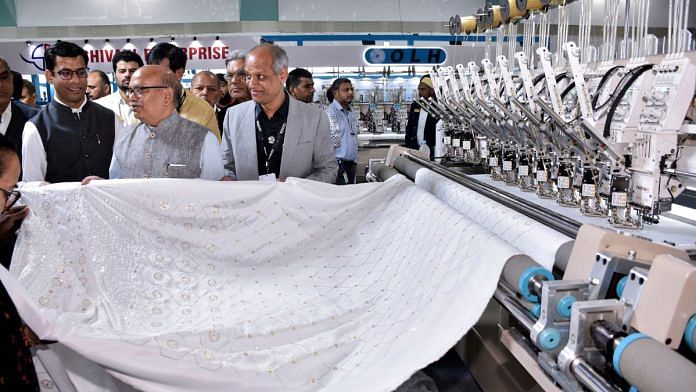This election season, China is more than just a talking point in Gujarat’s textile city, Surat, which has been in the news for producing a winner ahead of the polls. The China narrative has surfaced not just in internal industry chatter, but also quite prominently in stakeholders’ meetings between political parties and businesses, as suggested by conversations in Surat before the May 7 elections for 25 out of the 26 Gujarat Lok Sabha seats.
The stakeholders’ meetings, which attract anything between 500 and 1,000 business representatives and local politicians, kicked off in a big way a fortnight or so ago in Surat —ranked as one of the cleanest cities in the country, sharing the honours with Indore. It’s another matter that Surat and Indore have also shared another commonality recently. Both constituencies have seen the exit of Congress candidates in dramatic ways.
Yet, Surat is as much in election mode as any other part of the state, despite Mukesh Dalal of the Bharatiya Janata Party emerging as the winner after the disqualification of the Congress candidate and subsequent withdrawals of other contestants. Hotels, parks, and markets in the city are hosting campaigns and rallies like anywhere else. That’s because the two adjoining towns — Navsari (called the twin city of Surat) and Bardoli — are part of the Surat region. Situated on the banks of the Mindhola river, Bardoli — remembered for the start of the Satyagraha movement here — is some 35 km east of Surat. Navsari, about 37 km south of Surat, also holds historical significance. It’s known for the nearby Dandi village—the central point in the Salt March led by Mahatma Gandhi.
In this nostalgic setting, China is being spoken about in a matter-of-fact way. At the centre of it all are a series of QCOs or quality control orders, issued by the Union government. In the last one year, there have been some eight QCOs, including amendments related to technical textiles such as geo-textile, agro-textile and medical textile that are causing concern. The industry has already escalated the matter to the level of Union Finance Minister Nirmala Sitharaman, Commerce and Textiles Minister Piyush Goyal and Health, Chemical and Fertiliser Minister Mansukh Mandaviya, who’s among the few Union ministers contesting from Gujarat. Since some of the textile issues pertain to chemicals, Mr Mandaviya comes into the picture.
While QCOs are meant to prevent import of low-quality products, the idea is also to block dumping from China at cheap prices and strengthen India’s position in the supply chain. That is bothering the textiles industry, estimated at $165 billion (around Rs 13.7 trillion at the current rate of conversion). As a large portion of the supply of yarn comes from China at cheaper rates, blocking imports from that country has resulted in yarn shortages. According to the textile industry, China provides stability in price and quality. With that gone, it’s a fresh problem for the textile industry, which has gone through tough times in the recent past for various domestic and international reasons. The industry is asking for nothing short of removal of those QCOs, which are resulting in non-tariff barriers on textile businesses. If Chinese products can be allowed in certain sectors, why not in textile, is the question.
Also read: Why India’s critical textile sector, employing 4.5 crore people, is facing challenges
Micro, small and medium enterprises (MSMEs) and small weavers, already upset that there’s nothing for them in the textile production-linked incentive (PLI) scheme because of the quantum involved, say that the QCOs are a hurdle they can do without.
The list of orders on quality control talks about complex technical specifications that many of the textile traders may not fully understand. The items covered under the QCOs range from laminated high-density polyethylene woven geomembranes for waterproof lining to clothing made of limited flame spread materials, and the list is quite extensive.
The Bureau of Indian Standards (BIS) oversees the quality standardisation exercise for goods and articles across categories and sectors, from air conditioners to fans to kitchenware and clothes. In fact, central government ministries and departments issue QCOs after consultations with BIS. Any violation of the order can result in heavy penalties and even imprisonment.
There are reports suggesting that this year will see a further expansion of the list, with QCOs tapping some newer areas. Hoping that this will not dampen the spirit of Surat, the city which was earlier famous for silk weaving and is now a commercial centre for textiles. And hoping that its busiest textile markets, from Sahara Darwaja to Old Bombay Market, will remain robust in an election season and otherwise.
Nivedita Mookerji @nivmook is the Executive Editor of Business Standard. Views are personal.




When father was posted to Baroda, Surat textile manufacturers told him with a smile, Surat ka kapda lena nahin. Lena toh dhona nahin. Aur dhona toh phir rona nahin. Trust quality has improved in the intervening half century.
Socialist Modi murdabad. Free market zindabad.